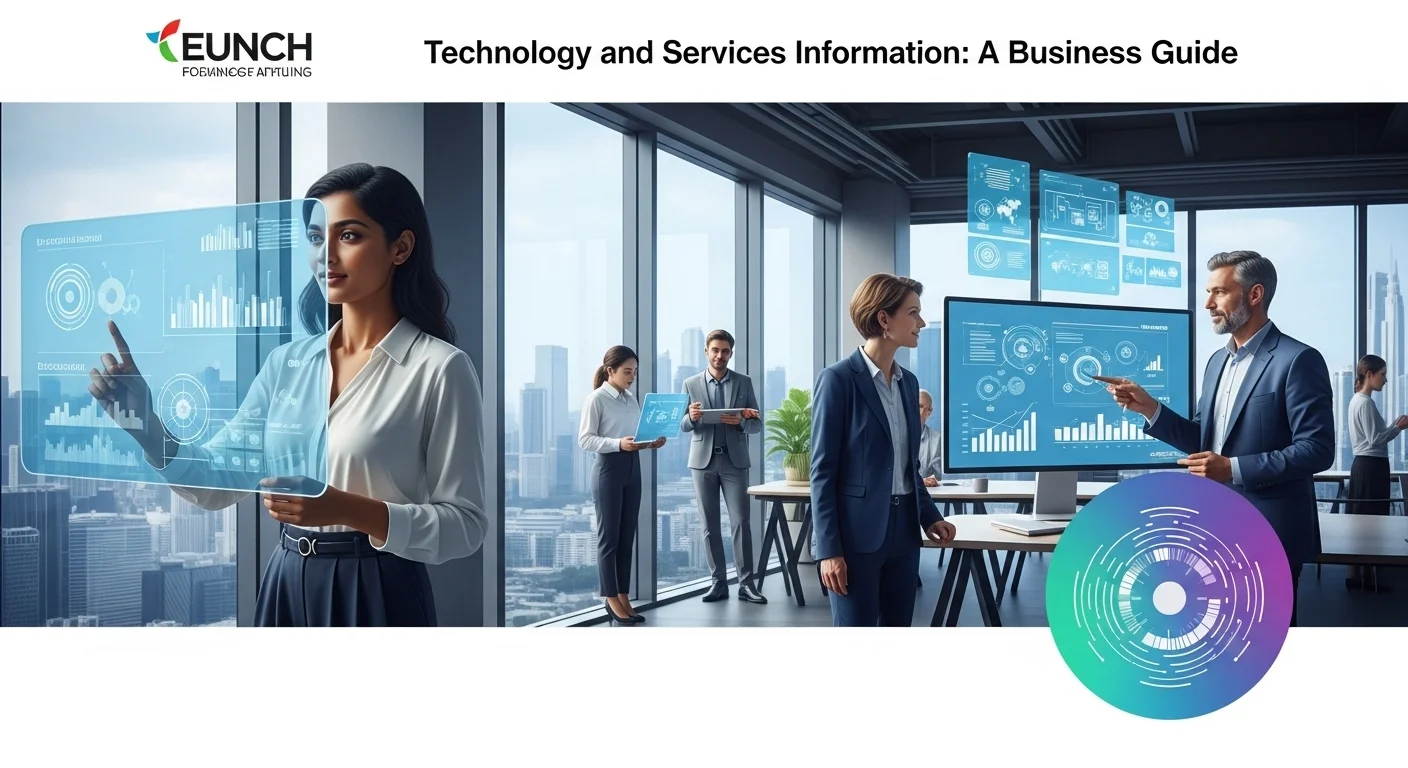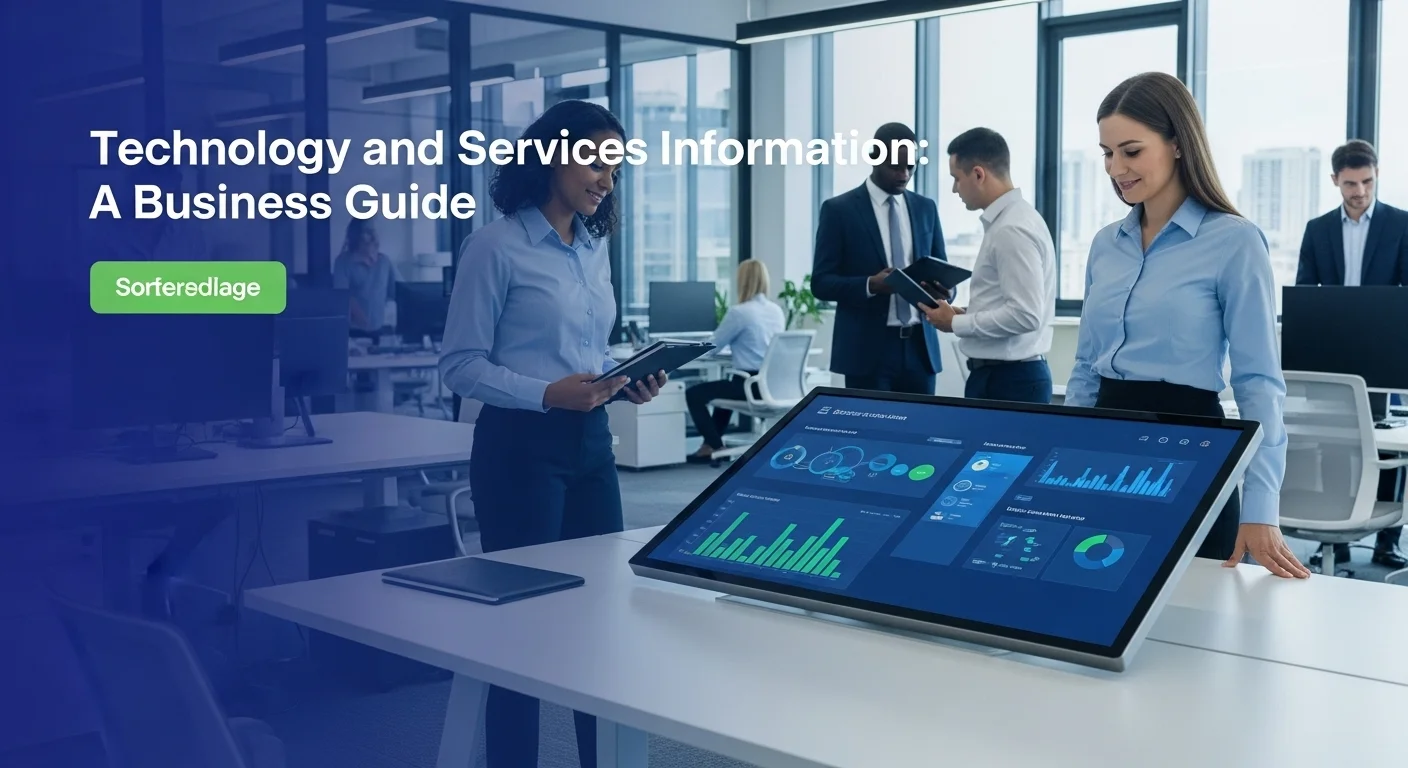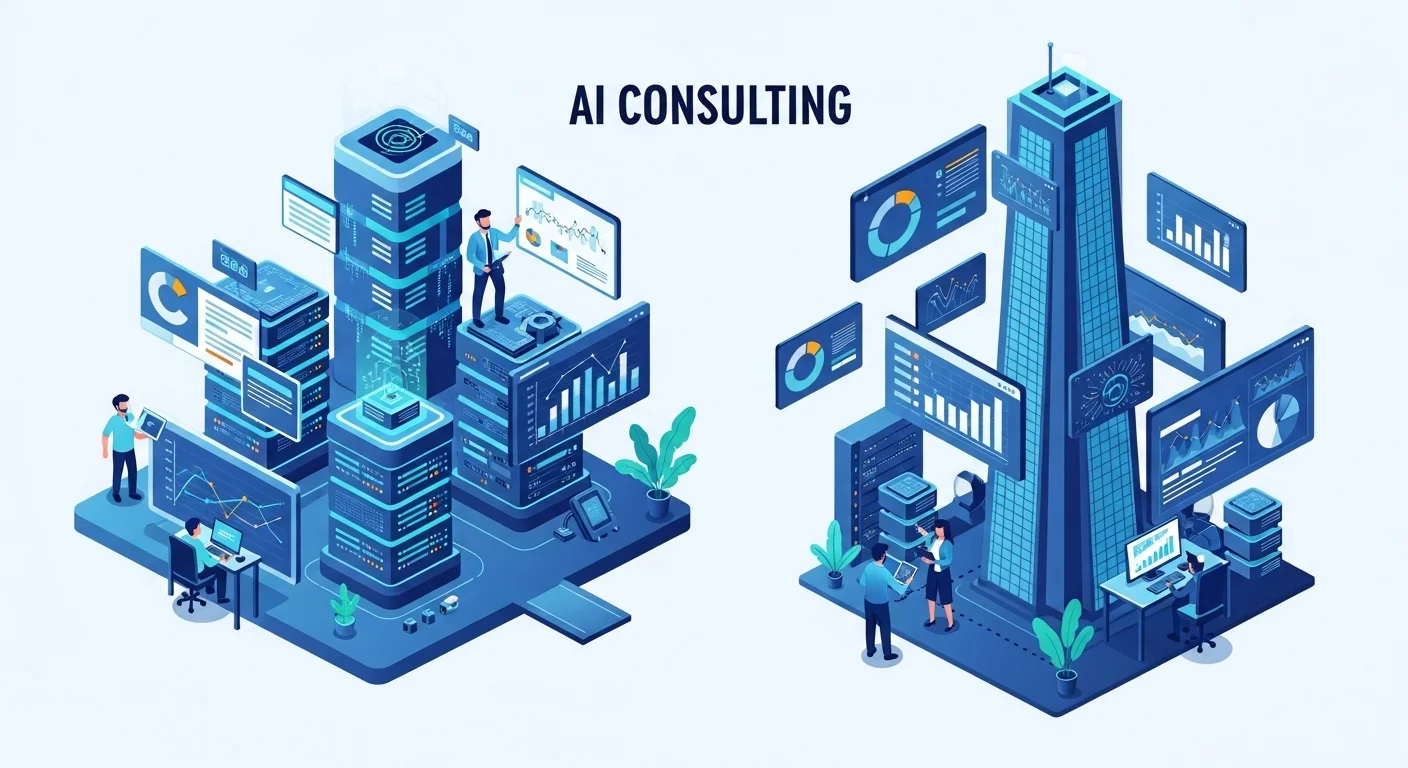Your Guide to Business Tech: From Cloud Services to Cybersecurity

Executive Summary
In today's digital world, 'tech services' are the engine that drives modern business. This isn't just about fancy gadgets; it's about the entire ecosystem of tools and expertise that manage, secure, and grow your company's most important asset: its information. From cloud storage and software subscriptions to the critical world of cybersecurity, understanding these services is no longer optional—it's essential for survival and success. I've spent years helping business owners make sense of this landscape, and in this article, I'll walk you through the fundamentals in plain English. We'll explore the different types of technology services available and place a special focus on why solid information security is non-negotiable. We’ll look at what cybersecurity services and expert consultants actually do to build a resilient company. By the end, you'll have the confidence to make smarter tech decisions, streamline your operations, and secure your digital future.
Table of Contents
Table of Contents
What Are Tech Services and Why Do They Matter?
Let's be honest, technology runs modern business. But what does that really mean? The term 'Technology Services' or 'Services Information' covers the huge range of support, infrastructure, and expertise that allows your company to operate efficiently and securely. It's not just the hardware or the software, but the strategic use of technology to deliver real value. Think of it as your company's complete digital toolkit. Without a smart approach to these services, a business today is like a ship without a rudder, lost in the competitive digital ocean.
The Three Pillars of Modern IT
I like to explain this by breaking it down into three core pillars. Think of it like building a house:
- Infrastructure Services (The Foundation): This is the digital land and foundation for your business. It includes the essential computing power, data storage, and networks. In the past, this meant buying and maintaining bulky servers in a closet. Today, it mostly means using cloud-based Infrastructure-as-a-Service (IaaS) from providers like Amazon Web Services (AWS) or Microsoft Azure. This gives you incredible flexibility to grow without massive upfront costs.
- Application Services (The Rooms and Furniture): These are the tools your team uses every single day. It's your email, your customer relationship management (CRM) system, your accounting software, and your collaboration platforms. Most of these are now delivered as Software-as-a-Service (SaaS), where you pay a subscription and the provider handles all the updates and maintenance. It’s like renting a fully furnished office.
- Business Process Services (The Property Manager): This involves outsourcing specific, tech-driven operations to specialists. Think of things like payroll processing, a customer support call center, or HR management. You hire an expert company that uses its own specialized technology to handle the entire function for you, letting you focus on what you do best.
The Unskippable Foundation: Cybersecurity
Now, imagine building that beautiful house on shaky ground. It wouldn't last long. That shaky ground is a lack of security. In an era where a single data breach can destroy a company's reputation and finances, information security services are the bedrock of your entire technology structure. Security isn't an add-on; it must be built into every server, every application, and every process. It's based on three simple but powerful principles: Confidentiality (only the right people see the data), Integrity (the data is accurate and can be trusted), and Availability (you can access your data when you need it). Every part of your tech ecosystem must be protected by robust security measures. This is where specialized cybersecurity services come in, offering the expertise to defend against an endless stream of threats like malware, phishing, and ransomware.
Real-World Benefits for Your Business
When you get this right, the benefits are huge. First, you gain massive operational efficiency. Managed services and automation handle routine tasks, cut down on manual errors, and free up your team to focus on growth, not just on keeping the lights on. Second, you become more agile. You can scale your resources up or down almost instantly based on demand, allowing you to pivot quickly in a changing market. This is a game-changer. Third, and most importantly, you dramatically improve your security. Partnering with a professional provider of information security services gives you a level of expertise and 24/7 monitoring that’s nearly impossible to achieve on your own. They manage things like firewalls, intrusion detection, and threat response, proactively keeping you safe.
The Small Business Superpower
For small and medium-sized businesses (SMBs), this service-based model is truly transformative. Not long ago, powerful technology and top-tier security were luxuries only large corporations could afford. Now, an SMB can access the same cloud computing, the same advanced software, and the same level of security as a Fortune 500 company, all on a pay-as-you-go basis. It levels the playing field. However, with great choice comes complexity. Figuring out the right path is where information security consulting services provide incredible value. A good consultant acts as your guide, assessing your unique needs and creating a tailored strategy that aligns your tech with your business goals, helping you invest wisely and avoid costly missteps.
Navigating the Challenges
Of course, it's not without its challenges. Relying on outside providers means you have to be good at vendor management—ensuring they meet high security and performance standards. You also have to make sure all these different services and apps can talk to each other; otherwise, you create frustrating data silos. The biggest challenge? The threat landscape is always changing. Security is not a 'set it and forget it' task. It requires constant vigilance and a commitment to building a security-first culture in your company. Many businesses address this by partnering with a Managed Security Service Provider (MSSP), which essentially acts as their outsourced, expert security team. They monitor everything around the clock, using advanced tools to protect you. An information security consultancy can help you define your strategy first, then help you pick the right MSSP to execute it. This strategic approach ensures you’re not just buying tools, but building a truly resilient business.

Your Playbook for Choosing and Using Tech Services
Navigating the world of tech services can feel like learning a new language. But once you understand the core concepts, you can build a strategy that’s both powerful and secure. This playbook breaks down the methods, techniques, and resources you'll need. The first thing to grasp is the delivery model. I’ve found a simple analogy works best: imagine you want to start a pizza business.
- Infrastructure-as-a-Service (IaaS): This is like being given a plot of land, a building, ovens, and electricity. You have to bring your own ingredients, recipes, and staff to make and sell the pizzas. It offers the most control and is great for businesses with complex technical needs. (Think: AWS, Google Cloud, Microsoft Azure).
- Platform-as-a-Service (PaaS): This is like renting a fully equipped kitchen in a shared commercial space. The ovens, mixers, and workspace are all managed for you. You just bring your unique recipes and ingredients to create your product. This model is perfect for developers who want to build, test, and deploy applications without worrying about the underlying infrastructure.
- Platform-as-a-Service (PaaS): This is like renting a fully equipped kitchen in a shared commercial space. The ovens, mixers, and workspace are all managed for you. You just bring your unique recipes and ingredients to create your product. This model is perfect for developers who want to build, test, and deploy applications without worrying about the underlying infrastructure.
- Software-as-a-Service (SaaS): This is like selling pizzas through a franchise. The brand, menu, marketing, and point-of-sale system are all provided. You just run the shop. This is the most common model and includes tools you probably already use, like Microsoft 365, Salesforce, or Shopify. It's convenient, but offers the least customization.
How to Choose the Right Services and Providers
Choosing the right services is more than just a tech decision; it's a business decision. I always advise my clients to follow a simple process. First, assess your needs. What specific problem are you trying to solve? Don't buy technology for technology's sake. Second, calculate the total cost of ownership (TCO), not just the monthly subscription fee. Factor in migration, training, and integration costs. Third, and this is crucial, do your homework on the vendor. Look beyond the flashy marketing. What is their reputation? Are they financially stable? Most importantly, what is their security posture? This is where an information security consulting service can be your best friend, helping you ask the tough, technical questions that protect your business down the line.
The Essential Layers of Your Digital Security
In my experience, too many people think of security as a single product, like an antivirus program. That's a dangerous mistake. A strong defense requires multiple layers—we call it 'defense-in-depth.' Here are the essential layers that form a comprehensive suite of cybersecurity services:
- Network Security: Think of this as the digital bouncer and security cameras for your office, controlling who comes and goes and watching for suspicious activity on your network. This includes managed firewalls and intrusion detection systems.
- Endpoint Security: Every laptop, server, and smartphone is a potential door for an attacker. Endpoint security puts a strong lock on every single one of those doors with tools like next-gen antivirus and endpoint detection and response (EDR).
- Cloud Security: Just because your data is in the cloud doesn't mean it's automatically safe. This layer focuses on correctly configuring your cloud environment, managing who has access to what, and ensuring you meet compliance standards.
- Application Security (AppSec): This is about finding and fixing security holes in the software you use or build before criminals can exploit them.
- Data Security: Ultimately, it's all about protecting the data itself. This involves powerful encryption (scrambling data so it's unreadable to outsiders) and data loss prevention (DLP) tools that stop sensitive information from leaving your network without permission.
Managing all these layers is a full-time job that requires deep expertise. That’s why many businesses partner with a provider of information security services, like a Managed Security Service Provider (MSSP). They offer these capabilities as a service, giving you 24/7 protection from a team of experts.
When to Call in a Strategic Consultant
So, when do you need a managed service versus a consultant? A managed service provider handles the day-to-day operations. An information security consultancy, on the other hand, provides project-based strategic guidance. You bring them in to solve bigger-picture challenges:
- Risk Assessments: A consultant analyzes your business to find out where your biggest risks are, so you can focus your security budget where it matters most.
- Compliance Audits: If you're in an industry like healthcare (HIPAA) or finance (PCI DSS), a consultant can help you navigate the complex rules and prepare for audits.
- Penetration Testing: This is where you hire an 'ethical hacker' to actively try and break into your systems. It's one of the best ways to find weaknesses before the bad guys do.
- Security Architecture Design: They help you design your technology environment to be secure from the very beginning.
- Incident Response Planning: They help you create a detailed playbook for what to do when a security breach happens, so you can respond quickly and minimize the damage.
The best strategies I've seen use both. The consultancy helps you build the right plan, and the managed service provider helps you execute it flawlessly every day. This dual approach ensures you're not just protected today, but are ready for whatever comes next.

Actionable Tips to Master Your Business Technology
Getting a handle on your technology services isn't just about buying the right tools; it’s about using them wisely. Over the years, I've seen firsthand what separates the businesses that thrive from those that just struggle along. It comes down to adopting smart strategies and best practices. The most important tip I can give is to foster a culture of learning. Technology, especially cybersecurity, changes fast. You have to stay curious and be willing to adapt.
Best Practices for Managing Your Tech Services
Effective management turns your technology from a cost center into a strategic asset. Here are a few key practices I always recommend:
- Have a Game Plan, Not Just a Shopping List: Before you adopt any new service, know exactly how it supports your business goals. Define what success looks like and how you'll measure it.
- Manage Your Vendors Like Partners: Your service providers are part of your team. Set up clear communication channels, review their performance regularly, and have a solid agreement (SLA) in place. Trust, but verify.
- Focus on the User Experience: Technology is useless if your team hates using it. Involve them in the selection process, provide great training, and make it easy to get support. Happy users are productive users.
- Automate Everything You Can: Free up your team from repetitive, manual tasks like password resets or basic monitoring. Automation reduces errors and lets your people focus on high-value work.
- Build a Central Knowledge Base: Create a single source of truth for both your users and your IT team. This should include simple how-to guides for users and detailed technical documentation for your staff. It’s a simple step that dramatically speeds up problem-solving.
Choosing and Implementing Smart Security
When it comes to security, your mindset matters as much as your tools. I often see businesses make the crucial first step of engaging an information security consultancy to get an unbiased view of their risks and create a roadmap. Once you’re ready to implement solutions, here are some tips:
- Adopt a 'Zero Trust' Mindset: The old idea of a secure internal network and an unsafe internet is dead. 'Zero Trust' is the new standard, and the concept is simple: never trust, always verify. It means you validate every user and every device trying to access your resources, no matter where they are.
- Layer Your Defenses: There's no magic bullet for security. A 'defense-in-depth' strategy is key. You combine network firewalls, endpoint protection, email filtering, and strong user authentication. If one layer is breached, others are there to stop the attack. This is the foundation of effective information security services.
- Be Obsessed with Vulnerability Management: You can't protect against weaknesses you don't know you have. Run regular, automated scans to find known vulnerabilities in your systems and patch them quickly, starting with the most critical ones. A penetration test, often offered by information security consulting services, gives you a real-world check of these defenses.
- Train Your Human Firewall: Your employees can be your strongest security asset or your weakest link. Invest in regular, engaging training to teach them how to spot phishing attacks, use strong passwords, and handle data safely.
- Plan for a Bad Day: It’s not a matter of *if* you'll face a security incident, but *when*. A detailed Incident Response (IR) plan is your playbook for that day. It defines roles, communication steps, and technical procedures to contain and recover from an attack. Practice it regularly!
To stay ahead of the curve, I always recommend leaders follow industry experts. A go-to for me and my clients is Brian Krebs' blog, 'Krebs on Security'. It provides deep-dive investigations into cybercrime and offers an unfiltered look at the real threats your business faces. Understanding the threat landscape helps you appreciate why a robust cybersecurity services program is so vital.
Ultimately, this all comes down to taking a proactive, holistic approach. It’s about blending people, processes, and technology into a single, resilient system. By implementing these practices and partnering with the right experts, you can build a technology foundation that not only protects your business but also empowers it to innovate and grow. I know it can seem daunting, but taking control of your technology is one of the most powerful moves you can make.
Expert Reviews & Testimonials
Sarah Johnson, Business Owner ⭐⭐⭐⭐
As a small business owner, this was a really helpful overview. It translated a lot of the confusing tech talk into plain English. I wish there were a few more step-by-step case studies, but it definitely clarified the basics for me!
Mike Chen, IT Consultant ⭐⭐⭐⭐⭐
A solid, well-researched article. It connects the dots between different service models and security effectively. I'll be recommending this to clients who need a foundational understanding of the modern IT landscape. Great job.
Emma Davis, Tech Student ⭐⭐⭐⭐⭐
Finally! An article that explains these complex topics so clearly. I've been studying for my cybersecurity certification, and this piece was incredibly helpful for seeing how all the components fit together in a real-world business context. Five stars!



